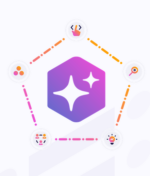
Anthropic, the AI company created by some of the original OpenAI founders, has announced the latest generation of its AI model family, Claude.
Claude 3 includes three AI models that vary in terms of capability, performance, and cost. From smallest to largest, these include Haiku, Sonnet, and Opus.
Haiku is the smallest and fastest model, which produces results almost instantly. Potential uses include customer interactions, content moderation, and optimizing logistics.
Sonnet is the medium model that offers a balance between intelligence and speed. It can be useful in processing data, making product recommendations, and code generation.
Opus is the most intelligent model and can take in open-ended prompts and uncommon scenarios and display a human-like understanding of them. Possible use cases include task automation, hypothesis generation in research, and advanced analysis of charts and graphs.
Its internal benchmarks show that the most powerful model, Opus, outperforms GPT-4 and Gemini 1.0 Ultra in all the categories it was tested for. The other two models were on-par for most categories, in some cases performing better and in some cases performing worse.
According to Anthropic, the Claude 3 models have advanced vision capabilities and can process a variety of visual components, such as images, charts, graphs, and technical diagrams. The company believes that this makes the models particularly useful for enterprise customers who tend to have PDFs, flowcharts, and presentation slides within their knowledge bases.
This family of models also refuses requests less frequently than previous generations. “The Claude 3 models show a more nuanced understanding of requests, recognize real harm, and refuse to answer harmless prompts much less often,” Anthropic wrote.
All three models will offer a 200K context window, but the company says the models are actually capable of accepting inputs over 1 million tokens.
Opus and Sonnet are available now, and Haiku is expected to become available soon. Sonnet is available through Amazon Bedrock and as a preview in Google Cloud’s Vertex AI Model Garden, and the other two models will be available there soon as well.






